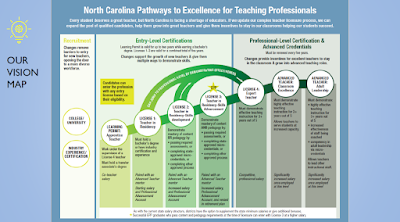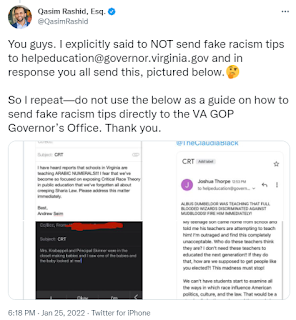North Carolina's public education system has been a mess for at least a decade, and some bright lights have another clever idea that will not help.
North Carolina is tied for #3 on the Public Education Hostility Index.Just to recap where we are, here's a partial listing of all the lousy ideas North Carolina has implemented so far.
NC implemented one of those flunk third graders if they don't as the Big Standardized Reading Test laws. They froze their already-lousy pay schedule for teachers (in NC, the state sets the pay levels) even as that pay was shown to be Very Not Good.. When a report showed charter schools not doing so great, the Lt. Governor ordered it rewritten to look less negative; then a few years later they did the same thing again. Maybe it's because they are a great haven for charter profiteers. They decided to shovel even more public money into the voucher pipeline, while cutting millions from public ed funding (for Democratic areas). They tried to follow the failed Tennessee model of a state-run achievement school district (but it failed). When the legislature tried and failed to end teacher tenure, they told teachers they could have a raise if they gave up their job protections. NC legislature is one of the ones that decided to fight on the hill of denying transgender bathrooms. And last year the Lt. Governor decided to oirganize a task force to catch any schools or teachers doing any naughty indoctrinatin' stuff--a state sponsored with hunt. This in a state where county commissioners can take school districts hostage if they don't like what the schools are teaching.

Periodically, leaders in North Carolina stop to scratch their heads and wonder why their public school system has trouble filling teaching positions.
Last week, the Governor's Teacher Advisory Committee listened to a presentation by the Professional Educator Preparation and Standards Commission about how to attract and retain teachers in North Carolina, and you probably can't guess what the solution is.
Licensure. The "most effective way to get and keep teachers [is] to change North Carolina's licensure process."
Hey--you know this is going to be a good idea because it grew out of discussions at the North Carolina Education Human Capital Roundtable, a group of "state education leaders and practitioners working together to find innovative ways to address the state's teacher shortage issue."
I'm guessing that "innovative" is the key word here, because ideas like "pay them more" and "treat them and the public education system with respect and support" are pretty inside-the-box old hat. As would be treating them like people and not "human capital."
The Human Capital Roundtable has been kicking this idea around for a while (they presented it to the state board about a year ago and they report that "there is nothing promised from the legislature at this particular point, but they are very interested in our work."
The proposal has a collection of old familiar reform parts.
Make the pool deeper. Right now, they note, people who want to be teachers go to four year teacher prep programs. So they propose to "widen the entrance" by letting any associate or bachelor degree qualify someone for licensure. I am not sure how this helps--is there a widespread problem with people who get a degree in some other area and are surprised and disappointed to discover that degree doesn't lead to teaching? People who want to be teachers, but who want to go to school for something else--well, I guess Teach for America has sort of introduced this idea? But okay--wider entryway.
Off ramps. The proposal calls for "clear exit points for ineffective teachers," aka the old "it should be easier to fire people from teaching." One reason would be a lack of content or pedagogical skills or competencies; if only they could have gone to college to get that kind of background.
Then there should be steps, so that there's a professional ladder for teachers to climb, because that will help. somehow. One of the presenters noted that teachers get good around years 5-7 and then plateau, and it's not clear if he thinks there are untapped levels of excellence that could be goosed or what.
So in this plan there are four "entry-level" certificates. Learning Permit, and Levels 1, 2 and 3. Learner Permits earn a co-teacher salary, while the others get a tad more. All these entry level teachers are paired with an Advanced Teacher mentor. Then there are three Professional-Level certificates that you can work up to.
The "working up to" part brings back some other old favorites, including getting competency-based micro-certificates. But the real kicker is called out in this quote:
The overarching goal is to create an outcomes-based licensure system.
The grand idea includes references to effective teaching and positive impact on students, which gets us right back to a system in which professional advancement depends on student test scores on the Big Standardized Test, which of course means that teacher's professional future is based on which students you are assigned to or the results of some criminally-inaccurate magic formula. (Oh look--brand new evidence that the popular measures for "effectiveness" are lousy.) If North Carolina officials are interested in outcomes, I'd suggest that the outcome of this idea will not be a bunch more teachers being recruited and retained by the state.
In their pitch last year, the human capital folks claimed, among other things, that this will restore "the respect the professions deserves," and maybe that's just a passive-aggressive slam about how it doesn't deserve much, because this plan sure doesn't offer any. They also claim to be the first in the nation to innovate this way," but there isn't a single new idea here.

These folks are also trying to sell this as a money-maker for teachers, saying teachers could "top out" around $70K instead of the current $50K, and that teachers could earn "almost $200,000 over a 30-year career than they do now" which is not impressive (that's $6,666 more per year). Increases would depend on getting through all the hoops, since this system would completely do away with annual steps. Not that North Carolina teachers haven't been left stuck on one step of the pay scale before. Nowhere is there an indication of what the bottom of this new scale looks like, which is an important item to look at, since plans to let teachers climb a ladder to success invariably start by digging a hole and dropping the bottom of the ladder a few feet lower than it currently stands (because part of the goal is always to pull off this triuck without actually spending more money on teachers).
GTAC also heard from BEST NC, which is a business coalition of education meddler/kibbitzers that's also been working on a plan called NC STRIDE that is supposed to help recruit teachers to NC. They've collected data and written recommendations and almost all of it is vague bureaucratic hoop and tape shuffling. They came up with 8 recommendations, 20 strategies, 150 actions, and 5 gateways.
The five gateways they examined are: interest, licensure, employment, exposure, and preparation. “Somewhere along these five gateways, they hit a wall,” Berg said of potential teacher candidates.
In other words, they don't have a clue what the problem is.
I can't figure out if all these folks are supremely clueless or are simply trying to paper over North Carolina's decade of unrelenting disrespect and erosion of support for public schools and the people who work in them. Do they really think they're holding a debutante's cotillion, or are they slapping lipstick on this human capital pig and hoping she'll pass? Either way, there will be oinking on the dance floor.
Money and respect, which includes professional autonomy and decent, well-resourced workplaces. It's not that big a mystery, except, apparently, in North Carolina.








